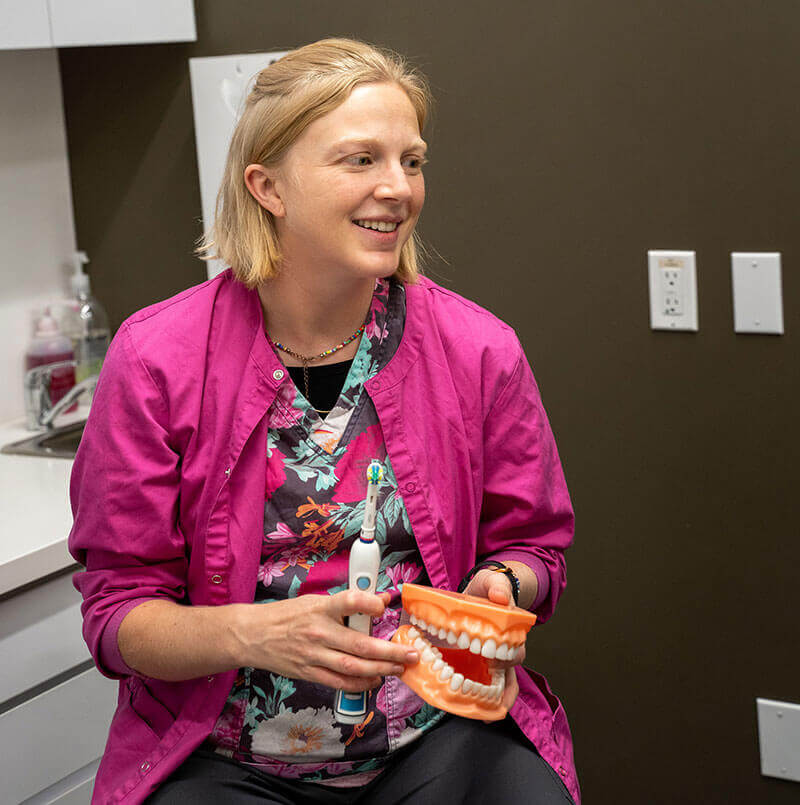Dental Hygienists
Caring for your smile
Working as a team, our hygienists collaborate with our dentists, dental assistants and specialists to develop the most appropriate treatment plan for your specific needs. Just as each patient is different, each approach is uniquely tailored.
Your dental hygienist is an essential part of your dental healthcare team. The hygienist will perform your hygiene therapy and regularly perform assessments of your gums while discussing your overall oral health and developing a good homecare routine with you. Once you have healthy teeth and gums, you will most likely spend more time with your hygienist than with your dentist. Your hygienist will work one-on-one with you to help you manage and improve your oral health. Other hygienist services include stain removal, fluoride application and sealant protection.
Your relationship with a dental hygienist
Your dental hygienist will be the person at your dental office you see most regularly. While all dental hygienists in the province are certified by the College of Dental hygienists of Ontario and can theoretically perform the same services, the relationship you form with your hygienist is very personal and important. Your hygienist will perform your cleanings, polishing, and fluoride treatments at your regular visits, take your x-rays, maintain accurate records in relation to your gums, keep track of your visits and dental issues and provide feedback on the effectiveness of your homecare.
The hygienist-dentist relationship
Typically, most visits begin with your dental hygienist. After your cleaning you may see the dentist for an examination. Dentists rely on their hygienists to be their first set of eyes and to convey any pertinent findings to the dentists during visits in which you do not see your dentist for an examination.
Where do dental hygienists do their training?
Dental hygienists graduate from a dental hygienist program at an accredited college. It is typically a 2-year program that covers anatomy, chemistry, physiology, pharmacology, microbiology, radiography, periodontology, oral pathology, dental materials, and histology. Graduates are then required to pass a licensing exam before being hired as a dental hygienist.

Procedures performed by dental hygienists
Fluoride treatments
Fluoride is a mineral that can repair teeth at the very early stages of tooth decay. In instances where there is early tooth decay, a fluoride treatment will help in correcting the issue.Cleanings and deep cleanings
A cleaning usually involves some plaque and tartar removal and polish. A deep cleaning involves scaling and root planing, a non-surgical procedure to treat periodontal disease. The former is the removal plaque, bacterial toxins and tartar deposits from your teeth and root surfaces below the gum line. The latter is a smoothing out of the rough areas on the root surfaces. This lets your gums heal properly and helps keep bacteria, plaque and tartar from reappearing underneath the gum line.Calculus removal
Calculus is another word for tartar, which occurs when plaque (a sticky colourless film we all have on our teeth), hardens because it was not sufficiently removed through regular brushing and flossing.Dental X-rays
Your dental hygienist can take x-rays of your teeth and other areas of your oral cavity to check for dental disease. The timing of x-rays is individualized based on your dental history and can be modified based on findings from your dental visit.all under one roof
Dental Hygienists Q&A
Yes. In fact regular hygiene appointments, coupled with diligent home care is a very good way to maintain optimum oral health at a low price.
The cost of a dental hygiene visit can vary based on the length of time that has elapsed since your last cleaning and also your homecare. When scheduling an appointment our reception staff can provide you with an estimate on the cost of your hygiene visit. If you would like, we can also send an estimate to your insurer to determine the extent of coverage for your hygiene visit.






New to the area?
We’re ready to care of your smile! If you’re new to the Yonge and Eglinton area, contact us to make an appointment for any of our services.
Related Articles:
Mouthwash and the associated benefits, Flossing for kids revisited, Getting Your Kids to Floss, Halitophobia: The Fear of Having Bad Breath, The DMFT Index: Healthy primary teeth by country, The one thing you shouldn’t do if you have morning sickness, A Sinus Infection and Tooth Pain, Valentine’s Day blog: Can a kiss spread gum disease?, Links between seasonal affective disorder and oral health, Why do we floss our teeth? This is why., How To Kill Bad Breath Just In Time For The Holidays, Becoming a dental hygienist in Canada, Preventing sugar related summer tooth decay, How to care for aging teeth into the golden years and beyond, Are you in gum disease denial?, British teeth aren’t as bad as you think, Mouthwash questions answered, Heart Disease – do right by your mouth, do right by your heart., Tooth Brushing – The Easiest New Year’s Resolution You’ll Ever Make, Nitrous Oxide — What it is and why we use it., Flossing works. Want proof? Look at your floss., Smoking: More than Just a Bad Habit, Oral care for seniors, Pregnancy and Oral Care, 3 teeth cleaning tools you may not know about, The Other Benefit of Flossing, Mouthwash: More Than Just Fresh Breath, Tooth myths debunked, Teeth Polishing: Give bacteria the slip, Hygienist Services – Scaling and Root Planing explained, Tips For Preventing and Soothing Tooth Sensitivity, Plaque vs Calculus, The Importance of Flossing Daily, Caring for your teeth between dentist appointments, Choosing a Toothbrush, 5 things a person’s teeth can instantly reveal about them, Everyone Should Be Flossing; Especially These People, Oral bacteria: The good, the bad and the cancer-causing kind

